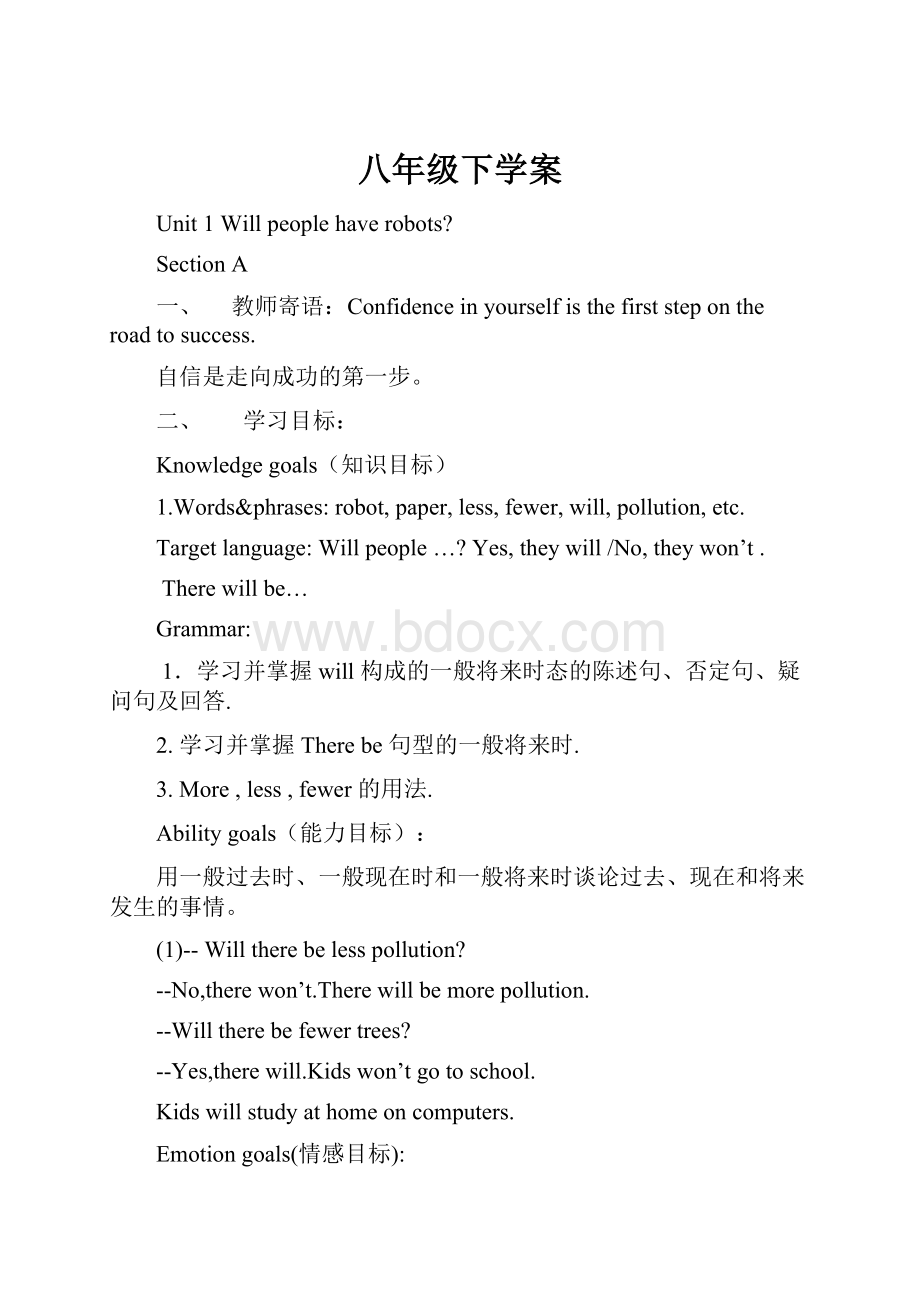八年级下学案.docx
《八年级下学案.docx》由会员分享,可在线阅读,更多相关《八年级下学案.docx(65页珍藏版)》请在冰豆网上搜索。

八年级下学案
Unit1Willpeoplehaverobots?
SectionA
一、 教师寄语:
Confidenceinyourselfisthefirststepontheroadtosuccess.
自信是走向成功的第一步。
二、 学习目标:
Knowledgegoals(知识目标)
1.Words&phrases:
robot,paper,less,fewer,will,pollution,etc.
Targetlanguage:
Willpeople…?
Yes,theywill/No,theywon’t.
Therewillbe…
Grammar:
1.学习并掌握will构成的一般将来时态的陈述句、否定句、疑问句及回答.
2.学习并掌握Therebe句型的一般将来时.
3.More,less,fewer的用法.
Abilitygoals(能力目标):
用一般过去时、一般现在时和一般将来时谈论过去、现在和将来发生的事情。
(1)--Willtherebelesspollution?
--No,therewon’t.Therewillbemorepollution.
--Willtherebefewertrees?
--Yes,therewill.Kidswon’tgotoschool.
Kidswillstudyathomeoncomputers.
Emotiongoals(情感目标):
1.通过本课的学习,对未来进行预测。
2.让学生在学习中学会交流、合作,体验学习成就感。
三、教学重难点
◆重点 由will构成的一般将来时态的句式。
◆难点1.more,less,fewer的用法。
2.therebe句式的一般将来时态therewillbe…
四、学习过程
1、预习导学及自测
A.英汉互译
1.污染_________2.空闲时间______________3.oncomputers___________
4.studyathome______5.in100years____________6.befree_________
B.用more,less,fewer填空:
1.Therewillbe________________(更多的建筑)in50years.
2.Thestudentswillhave_______________(更少的家庭作业)todo.
3.Therewillbe________________(更少的污染)here.
4.Kidswillhave________________(更少的计算机)intheirclassroom.
5.Therewillbe________________(更多的图书馆)inthiscity.
6.Therewillbe________________(更少的树)inthepark.
2、语法小结:
一般将来时
1)一般将来时由“助动词will+动词原形”构成,表示将来某个时间要发生的动作或存在的状态,常与表示将来的时间状语连用,如:
tomorrow,nextweek,nextyear,inthefuture等。
例如:
(1)Wewillcometoseeyounextweek.
(2)--Willpeopleusemoneyin100years?
--Yes,thetwill./--No,theywon’t.
(3)Howwilltheworldbedifferentinthefuture?
2)用bedoing表示将来:
主要意义是表示按计划、安排即将发生的动作,常用于位置转移的动词。
如:
go,come,leave,arrive等,也可用于其他动作动词。
Wearehavingfishfordinner.
Wearemovingtoadifferenthotelthedayaftertomorrow.
这种用法通常带有表示将来的时间状语,如果不带时间状语,则根据上下文可表示最近即将发生的动作。
A:
Whereareyougoing?
B:
Iamgoingforawalk.Areyoucomingwithme?
A:
Yes,Iamjustcoming.Waitforme.
3)用begoingtodo表示将来:
主要意义,一是表示“意图”,即打算在最近的将来或将来进行某事。
Areyougoingtopostthatletter?
Howlongishegoingtostayhere?
3、自主探究
你能发现下面的亮点吗?
(1)Doyouthinktherewillberobotsinpeople’shomes?
此句是一含宾语从句的主从复合句,Doyouthink…是主句,therewillbe…是宾语从句。
Doyouthink…?
答语一般为:
Yes,Ithinkso.或No,Idon’tthinkso.有时doyouthink作为插入语,放在特殊疑问词后,该疑问句的其他部分应为陈述语气。
a.你认为十年后你会干什么?
________________________________?
b.Ithink:
我认为每家都会有个机器人。
_______________________
c.Idon’tthink:
我认为将来孩子们不会去上学。
_______
(2)Therebe句型:
①构成:
肯定句:
Therebe+某人/某物+地点/否定句:
Therebe+not,some改any,(notany可以换成no)/一般疑问句;be提前,some改any
②therebe接词要运用就近原则.
a.There____abookandtworulersonthedesk.
b.There____tworulersandabookonthedesk.
③Therebe句型有时态的变化
a.一般现在时:
Thereis/are…b.一般过去时:
Therewas/were…
c.一般将来时:
Therewillbe… / Thereis/aregoingtobe…
⑶Bookswillonlybeoncomputers,notonpaper.书只会在电脑上,而不会在纸上。
①papern.纸;纸张,是不可数名词。
表示“一张纸”用apieceofpaper;“两张纸”用twopiecesofpaper。
桌子上有一张纸。
__________________________________.
②papern.试卷,作可数名词,有复数形式。
我丢了一份历史试卷。
_________________________________.
⑷Therewillbefewerpeople.将有更少的人。
①本句是含有therebe句型的一般将来时的简单句。
结构为:
Therewillbe+主语+其他。
其否定形式是在will后加not;疑问句形式是把will提到there前。
简略肯定回答:
Yes,therewill.简略否定回答:
No,therewon’t.
a.将没有足够的给人住的空间。
________________________.
b.世界上将有更少的动吗?
?
②feweradj.(few的比较级)较少的;更少的,修饰可数名词的复数
Ihavefewerfriends.我有更少的朋友。
fewer,less和more
fewer
较少的;更少的,few的比较级,修饰可数名词复数
我朋友比我的苹果少。
__________________________________.
less
较少的;更少的,little的比较级,修饰不可数名词
我钱包里的钱更少了。
____________________________________.
more
更多的,many和much的比较级,可修饰可数名词,也可修饰不可数名词。
瓶子里的水更多了。
______________________________.
我们有更多的挑战。
____________________________________.
注意:
few和little表示否定,意为“几乎没有”;
afew,alittle表示肯定,意为“有一点儿”。
可别混淆哦!
⑸WhatdoyouthinkSallywillbeinfiveyears?
你认为萨利五年后将会做什么?
①doyouthink
Unit2WhatshouldIdo?
SectionA
一、Teacther’swords:
Athousand-lijourneyisstartedbytakingthefirststep.
千里之行,始于足下.
二、learningaims
1.keywords:
playloudarguewrongstylecouldshouldticketsurpriseeither
2.keyphrases:
keepout,arguewith,outofstyle,callsb.up,aticketto,onthephone,
payfor,part-timejob
3.Keysentences:
1)What’swrong?
WhatshouldIdo?
2)Hedoesn'thaveanymoney,either.
3)Whatshouldtheydo?
Theyshouldtalkabouttheirproblems.
4.Abilityaim:
Talkaboutproblemsandgiveadvice.
5.Moralaims:
增进同学之间的友谊,互敬互爱,懂得关心他人是一种美德
三、教学重、难点
1.What’swrong?
What’sthematter?
2.Youcouldwritehimaletter.
Theyshouldtalkabouttheirproblem.
四.学习过程
Step1.基础回顾
复习句型:
What’swrong?
What’sthematter…..?
单词大比拼,看谁能用最快的速度记住下列单词。
不让----进入keepout使惊奇;使意外surprise
票;入场券ticket争论,争吵argue
不时髦的;过时的outofstyle用电话交谈;在通话onthephone
错误的;有毛病的wrong付---帐付买---的钱payfor
兼职工作part-timejob青少年论坛TeenTalk
Step2.自主学习合作探究learningcourseaboutwords
1.keepout=不让…进入
eg.别让那只狗进入我的房间
2.playv.播放,玩-n.播放器/运动员
eg,播放CD播放器
3.loudadj./adv吵得,声音大的.①播放CD声音大
②大点声说,loud作副词指说话声音大些
说话声音太吵,loudly作副词指说话声音大的太吵
4.①与某人辩论某事
与某人谈论某事
eg.Idon’twant我不想再那件事上与你争吵
②支持反对
③arguesb.intodoingsth.说服某人做…
说服某人不做某事
eg.她的父母说服他去参军。
Hisparentstried
5.wrongadj.错误的,有毛病的,eg.你怎么了?
What’s///withyou?
6.stylen.风格eg.流行:
=
过时:
=
7.情态动词及过去式均可作为委婉语气词:
eg.
can可以-,may也许-shall应该-will愿意,将要-
eg.MayIcomein?
Yes,我可以进来吗?
当然
CouldIgototheparty?
.我可以去聚会吗?
不,你不能。
?
Youshouldwritehimaletter.我该怎么办?
你该给他写信
8.①打电话的8种表达方法:
callsb.up.=callsb.=
=makesb.acall==givesb.aring=telephonesb.=phonesb.
②请给我回电话.
9.ticket复数tickets常与介词连用
eg.给我一张球赛票Pleasegiveme
10.surprise
①v.惊讶给某人惊讶,surprisesb.=
②v-adj.通常修饰人,或是人做主语,
通常修饰物,或是物作主语.
③v-n.surprise.令某人惊讶的是,
eg.Ithisnews.我对这个消息感到惊讶。
Thisisaresult.这是一个令人惊讶的结果。
11.talkonthephone用电话交谈,on是介词,有的意思
eg.通过无线电,通过网络通过电视
此外on作为介词有进行的意思:
eg.在执勤,干值日在度假从事
12.pay过去式可以与spend/cost替换
eg.Ipaidsomemoneythesebooks.我花钱买了一些书
=Isomemoneythesebooks.
=Thesebooksmesomemoney.
13.①findapart-timejob找一份兼职工作,反全职的.
②okey=,区分:
That’sright:
That’sall:
It’sright:
That’sallright:
=Itdoesn’tmatter。
14.either:
adj:
任一的
①IlikeEnglish,too(变否定句):
②ofthemisok:
他们中任意一个都很好。
ofthemisok:
他们两个都不好。
ofthemareok。
两个都很好。
ofthemlikeEnglish。
他们所有都喜欢英语。
Step3.Grammer:
情态动词shall和should的用法
㈠Shall的用法:
1.Shall用于第一人称,表示征求对方的意愿或说话人征求对方的意见或向对方请示,如:
Whatshallwedothisevening?
今晚我们做什么呢?
Shallwebeginourlesson?
我们开始上课?
2.Shall用于第二、第三人称,表示说话人给对方命令、警告、允诺或威胁。
如:
Youshallfailifyoudon'tworkharder.(警告)
HeshallhavethebookwhenIfinishreading.(允诺)
Heshallbepunished.(威胁)
㈡Should的用法:
1.Should表示劝告、建议、命令,其同义词是oughtto;在疑问句中,通常用should代替oughtto。
如:
Youshouldgotoclassrightaway.你该马上去上课。
Should的含义较多,翻译用法较活,请看下面的句子:
①Ishouldthinkitwouldbebettertotryitagain.我倒是认为最好再试试。
②Youaremistaken,Ishouldsay.依我看,你是搞错了。
③Ishouldadviseyounottodothat.我倒是劝你别这样做。
④ThisissomethingIshouldhavelikedtoaskyou.这是我本来想问你的。
从以上例句可以看出:
情态动词should用于第一人称时可以表示说话人的一种谦逊、客气、委婉的语气。
Unit3WhatwereyoudoingwhentheUFOarrived?
SectionA
【教师寄语】Nothingisdifficultifyouputyourheartintoit.
世上无难事,只怕有心人。
【知识目标】本课的13个单词以及相应的动词短语、介词短语。
①A:
WhatwereyoudoingwhentheUFOarrived?
B:
IwasstandinginfrontofthelibrarywhentheUFOarrived.
②A:
WhatwastheboydoingwhentheUFOlanded?
B:
Hewassleepinglate.
【能力目标】熟练运用本课词汇及句型谈论在过去某一时间发生的事情。
.
【情感目标】培养学生正确的价值观。
【重点】过去进行时was/were+doingsth.
【难点】过去进行时时态的熟练运用,when和while的用法区别
【学习过程】
Step1
Dothefollowingexerciseandchecktheanswersbygroupleader.
1.一个飞碟_____________2.理发店_________3.在盥洗室_________
4.在卧室__________5.在厨房里____________6.出去_______________
7.一个外星人__________8.buy(过去式)__________9.get(过去式)______10.一次不寻常的经历______11.起飞________12.kid(现在分词)_________
Step2Grammar
(一)过去进行时
1.含义:
表示过去的某一时刻或某一时间内正在进行或发生的动作。
2.构成:
was/were+v-ing。
3.标志:
atthattime,thistimeyesterday,alltheevening,from8:
00to10:
00yesterday,justthen,atnineyesterday,when等表示明确有具体的时间状语。
eg:
Iwasdoingmyhomeworkatthistimeyesterday.
WhatwasTomdoingattenyesterday.
Iwaseatingdinnerwhenthephonerang.
4.具体的句型:
(1)肯定句:
主语+was/were+v-ingeg:
Theywerehavingameetingthattime.
(2)否定句:
主语+wasnot(wasn’t)/werenot(weren’t)+v-ing
上句改写为:
Theywerehavingameetingthattime._____________________
(3)一般疑问句式:
Was/Were+主语+v-ing?
肯定回答:
Yes,…was/were.
否定回答:
No,…wasn’t/weren’t.
Eg:
Wasshereadingabookwhentheteachercamein?
Yes,shewas./No,shewasn’t.
(二)when与while用法
1.when是“当……时候”,相当于atthattime,既可以表示某一时刻又可以表示某一段时间,所以when引导的时间状语从句动词既可以是延续性的,又可以是非延续性的。
when引导的时间状语如果是一般过去时,主句一般用过去进行时。
而while也意为“当……时候””,相当于duringthetime,表示某一段时间历里的情况,故其引导的时间状语从句中的动词必须是延续性的。
eg:
WhileIwaswatchingTV,mymothercameback.
=Whenmymothercameback,IwaswatchingTV.
2.while重在强调其后的动作与助于动作的对比,表示“与此同时”。
eg:
ShewaslisteningtomusicwhileIwasplayingcomputergames.
3.when/while练习
1)_____theteachercamein,weweretalkingandlaughing.
2)Igothome______mymotherwascookingdinner.
3)Theyweredancing_____wecametomeetthem.
4)_______thealienwasvisitingthemuseum,theboycalledthepolice.
Step3学习3a部分
1.读课文,写出下列短语和句型。
1)一次不寻常的经历__________2)大约在十点左右
3)跟随某人做某事______4)它是多么的奇怪!
_______
5)当它走进一家礼品店的时候我感到非常惊讶。
__________________________________________
6)太不可思议了。
__________________________________
2.再读短文,回答问题。
1)WhendidtheUFOland?
whatwasthewriterdoing?
2)Whatplacesdidthealiengo?
whatdidtheydo?
3)Didthealienbuyanysouvenirsintheshop?
4)Whatdidthewriterdowhilethealienwasinthemuseum?
【当堂达标】
(一)根据句意及首字母完成单词
1.MysisterwaswatchingTVw_______shewashavingsupper.
2.Mymotherwascookinginthek_______whenIgot